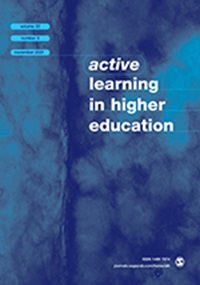Psychological safety in online interdisciplinary student teams: What teachers can do to promote an effective climate for knowledge sharing, collaboration and problem-solving
IF 3.2
1区 教育学
Q1 EDUCATION & EDUCATIONAL RESEARCH
引用次数: 0
Abstract
Interdisciplinary complex problem-solving relies on psychologically safe teamwork where individuals feel confident to speak up with unique knowledge, or voice dissent. Existing studies on psychological safety (PS) have mainly concentrated on developing diagnostic tools and categorising the antecedents to psychologically safe interactions in face-to-face teams. Few focus on the establishment and maintenance of psychological safety in online teamwork, let alone in the context of now-prevalent online learning in higher education. Leveraging the natural experiment in online teaching and learning brought about by COVID-19 lockdowns, we conducted a preliminary study that combines quantitative and qualitative methods to examine the extent to which, and how, undergraduates experience psychological safety in virtual teams. Students reported experiencing relatively high psychological safety in their collaborations, yet the results also suggest that specific elements of instructional design were needed to support the establishment and maintenance of psychological safety in the online environment. These measures include extra provision for timetabled group work, demonstrating openness and curiosity, designing assessment tasks that necessitate diverse contributions and normalising constructive failure through iterative feedback. Pedagogical tools and practices related to these measures can help online student teams build and sustain psychologically safe collaboration to optimise problem-solving and innovation.在线跨学科学生团队的心理安全:教师如何促进知识共享、协作和问题解决的有效氛围
跨学科复杂问题的解决有赖于心理安全的团队合作,在这种合作中,每个人都有信心说出自己的独特知识或表达不同意见。现有的心理安全(PS)研究主要集中在开发诊断工具和对面对面团队中心理安全互动的前因后果进行分类。很少有人关注在线团队合作中心理安全的建立和维护,更不用说在高等教育中普遍存在的在线学习背景下了。利用 COVID-19 禁用带来的在线教学自然实验,我们开展了一项初步研究,结合定量和定性方法,考察本科生在虚拟团队中体验心理安全的程度和方式。学生们报告说,他们在合作中体验到了相对较高的心理安全感,但研究结果也表明,需要教学设计中的特定元素来支持网络环境中心理安全感的建立和维持。这些措施包括额外提供定时小组工作、展示开放性和好奇心、设计需要不同贡献的评估任务,以及通过迭代反馈使建设性失败正常化。与这些措施相关的教学工具和实践可以帮助在线学生团队建立和维持心理安全协作,从而优化问题解决和创新。
本文章由计算机程序翻译,如有差异,请以英文原文为准。
求助全文
约1分钟内获得全文
求助全文
来源期刊

Active Learning in Higher Education
EDUCATION & EDUCATIONAL RESEARCH-
CiteScore
13.20
自引率
12.00%
发文量
31
期刊介绍:
Active Learning in Higher Education is an international, refereed publication for all those who teach and support learning in higher education (HE) and those who undertake or use research into effective learning, teaching and assessment in universities and colleges. The journal is devoted to publishing accounts of research covering all aspects of learning and teaching concerning adults in higher education. Non-discipline specific and non-context/country specific in nature, it comprises accounts of research across all areas of the curriculum; accounts which are relevant to faculty and others involved in learning and teaching in all disciplines, in all countries.
 求助内容:
求助内容: 应助结果提醒方式:
应助结果提醒方式:


